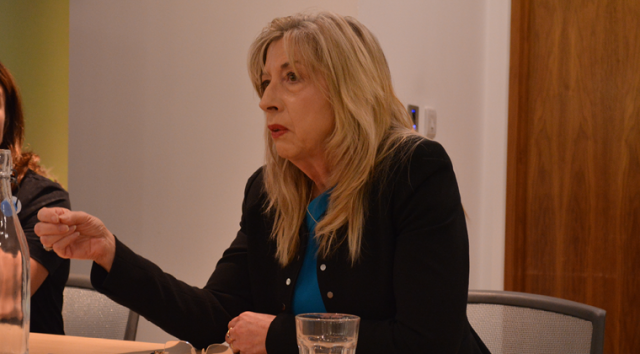News
Mental health and wellbeing in the spotlight for Biology Week Policy Lates event
- Details
- 12 October 2017
The RSB’s Policy Lates series returned this week with a discussion on the biology of mental health and wellbeing, as part of Biology Week 2017.
A panel of scientists came together to present their research and to discuss the biology underpinning mental health and wellbeing for the event, A meeting of Minds: the biology of mental health.
FLTR: Dr Valerie Gladwell, Professor Barbara Sahakian FRSB, Dr Karen Mifsud, Professor Jeremy Pritchard FRSB and Professor Clare Stanford FRSB (Photo credit: RSB)
The event, which marked World Mental Health Day, was chaired by Professor Jeremy Pritchard CSciTeach FRSB: director of education for the College of Life & Environmental Sciences at the University of Birmingham, and chair of the Education, Training and Policy Committee of the RSB.
Around one in four adults is likely to have a mental health problem in any year, and the topic has grown in prominence recently, with a Government pledge to deliver ‘parity of esteem’ between mental and physical health by 2020.
Professor Clare Stanford FRSB, emeritus professor of neuropharmacology at University College London, began the event by describing historical attitudes towards mental health and noting the relatively small amounts donated to UK mental health charities compared with those for physical conditions.
Stanford outlined some of the scientific methods currently used to study mental health and wellbeing, along with some of the neurological processes involved in influencing mood, cognition and other mental functions.
Following their presentations was a lively discussion with the audience (Photo credit: RSB)
Dr Karen Mifsud, senior research associate within the Neuro-Epigenetic Research Group at the University of Bristol, described the influence of hormones during a stressful event, and shared research on interactions between receptors and genes, affecting gene expression.
Mifsud called for greater collaboration between basic and clinical researchers, and emphasized the extent to which individuals can respond differently to similar events.
Dr Valerie Gladwell, Chair of HEAL research group from the University of Essex, discussed her research into the links between exercise and interactions with nature on mental wellbeing. Gladwell explained that time spent outdoors provides a positive distraction from the daily stress we experience in urban environments, that can be beneficial for mental wellbeing.
Professor Barbara Sahakian FRSB (photo credit: RSB)
Professor Barbara Sahakian FRSB, professor of clinical neuropsychology at the University of Cambridge, gave the final presentation. Sahakian explained that mental illness predominantly affects young people, with 75% of illnesses beginning before the age of 24. She shared five things that may improve mental wellbeing including exercise, being mindful, life-long learning, maintaining social connections, and acts of benevolence- such as giving to charity.
The audience had a chance to question the panel, sparking discussions about the effects of increasing mobile phone use on mental health, how to reach those most in need of mental health services, and the possible effects of diet on mental health.
The evening was livestreamed on the Biochemical Society Facebook page and is available to watch again here, while photos of the event are available on the RSB Flickr page.
The event was part of Biology Week 2017, and was held with support from the Biochemical Society, as well as the British Ecological Society and The Physiological Society, which has this year had a focus on making sense of stress.




